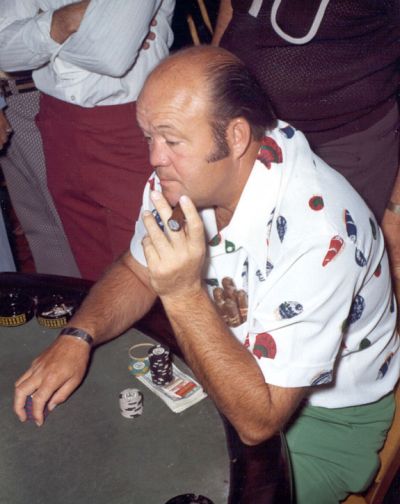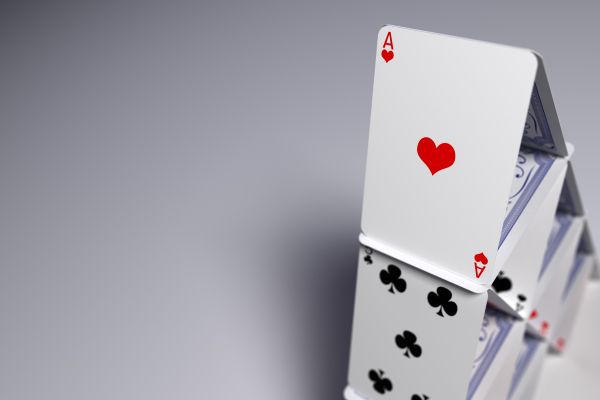

They don't make gamblers like Walter Clyde 'Puggy' Pearson any more. If they ever did.
Nope, when the redneck gambler from Kentucky and later Tennessee was born, the Lord threw away the mold. Because Puggy Pearson was about an original a human being as you will ever meet.
Here's an example of Puggy's red neck originality. One night he was playing poker at Binion's Horseshoe and losing steadily. The female dealer was tossing him bad cards or cards that would suck him into a hand and then he would be outdrawn.
Finally Puggy had had enough. When the woman dealer finished her shift and stood up to be relieved, Puggy also stood up. According to witnesses, the next thing the female dealer knew, she felt something warm and liquid on her shoe. After a stunned silence, there was outrage, most of it from he purple-faced dealer. She didn't only want Pearson banned from the premises -- she wanted him shot.
Binion's did the next best thing. The poker room management ordered him to leave and leave he did. He stayed away until the management invited him back -- but only if he promised to behave himself in the future.
Behave himself? A redneck gambler like Puggy who wrote a song, 'Roving Gambler,' and published the lyrics on his colorful Poker-Mo-Bile, a comfortable air-conditioned van that he drove around the country.
Just like nobody knows the real you or me, nobody knew he real Walter Clyde 'Puggy' Pearson. Oh, we knew some of the facts. He was born on Jan. 29, 1929 in Adairville, Ky., one of 10 children to a rock crusher in his wife. He moved to Tennessee at a young age and dropped out off school in the fifth grade to work odd jobs and help his family survive. That at age 12 while trying to impress some girls, he walked on his hands and a loose floorboard shot up and flattened his nose, thus giving him his lifelong nickname.
I knew Puggy when I lived in Las Vegas and Lake Elsinore, CA. I admired his independent spirit and his poker playing style. And I became the beneficiary of his generosity as I will reveal to you later.
At age 16 just after World War 2 ended, he joined the U.S. Navy and stayed there for three terms of enlistment. During those 12 years, Puggy sailed to many exotic ports of call. He learned to play poker, craps and other gambling games, and he adopted a life-long habit of smoking big cigars.
Puggy loved a good cigar. It gave him the look of a man-about-town that he enjoyed acting out for the benefit of those present. As for his poker winnings on shipboard, he far outstripped his earnings as a sailor. When the Navy gave him an honorable discharge, Pearson had $20,000 in cash burning a hole in his pockets.
Las Vegas seemed a natural place for Puggy and he set up housekeeping there. He fit in well with the colorful characters who frequented the casinos in the city that never sleeps. He became one of them and partnered up with people like Doyle 'Texas Dolly' Brunson, Sailor Roberts, Amarillo Slim Preston and Benny Binion.
Indeed, it was Puggy and his friends who convinced Binion that he should add a big freeze-out tournament to his poker games -- one with no re-buys played down to the last person with a winner-take-all. Binion followed their advice and in 1970, the World Series of Poker was born.
Pearson needed only three years to win the $10,000 buy-in tournament. In 1973, he played down to the final table and his ace-seven off-suit beat the king-jack off-suit held by Johnny Moss. Puggy won the tournament and pocketed $130,000.
He also won three other WSOP tournaments that year, two of them in seven-card stud, for winnings totaling over $300,000. His superior play also earned him three gold diamond-encrusted bracelets.
While poker was his main cash game, he was also a scratch golfer who could probably have done well on the Professional Golfer's Assn. circuit. In fact, some of his friends insist he won more hustling at golf than he ever did playing poker. In one match alone, he won $300,000 from his opponents.
In another match, a PGA golfer wrote out a check for the $7,000 he had lost to Puggy and handed it to him in the clubhouse.
'Puggy, I have been around a lot of golfers, including Jack Nicklaus,' the pro said. 'You are about as good a chipper and putter as I have ever seen.'
Grinning, Pearson removed the cigar from his mouth. 'Hell, Son,' he said, 'you should have seen me 10 years ago.'
He was very generous in sharing his knowledge of what it required to be a winning gambler.
'Gambling is like being in business,' he told a magazine writer. 'You have to by low and sell high. If it's poker, you also have to know what the other person is thinking. With the good players, we all know what the other guy is thinking. That takes poker to another dimension.'
Puggy admitted to another interviewer that he saw himself as an orchestra leader holding a baton. He also equated himself as the principal of poker or whatever game he was playing, and all the other players were students.
In 1987, he was elected to the Poker Hall of Fame, the second person chosen. Johnny Moss was the first.
Doyle Brunson, who is no slouch at gambling himself, called Pearson 'the greatest pressure putter of all time.' During a discussion with some poker-playing friends about which person they would want to attempt a 10-foot putt if their life was a stake, the others chose Jack Nicklaus, Tom Watson or some other top PGA player. Not Brunson. He picked Puggy.

Mike Sexton, who ushered in 'Poker After Dark' and who along with Dick Van Patten was instrumental in televising many World Poker Open and other major tournaments, agreed that Puggy Pearson had a deservedly bad reputation for the way he treated some dealers.
But Sexton quickly added, 'Puggy has a heart of pure gold when it comes to financially helping poker dealers or poker players who are down on their luck. If a dealer is sick or dies, he is one of the first people there to help the dealer or the family.'
From my own personal experience, I know Sexton is right.
I know this for a fact. When the late Stu Ungar was in a Las Vegas hospital after suffering a near fatal drug overdose, Puggy visited him. A nurse told me that Ungar was comatose, but Puggy talked as though he could hear him. The WSOP was about to start and as he was leaving, Puggy, dropped a thousand dollars in hundred-dollar bills on Stu's bed. He said he was repaying Ungar for a loan when there was no loan. Pearson just wanted Stu Ungar not to die broke.
Puggy also helped me out less than a year before he died. I was living in Lake Elsinore, CA. after going through a painful divorce. Because of my status as a professional ghostwriter, Pearson had hired me to work on his autobiography, which he later published.
He dropped in on me unexpectedly while driving to San Diego to play in a poker tournament. I spent an enjoyable evening playing at his table and he showed me few moves, always with a wink, that only a master poker player could make.
Around 10 p.m., he decided it was time to get back on the road. As we walked out to his van, he said, 'How are you doing financially? Now be honest with me.' I told him that I was struggling, but I thought I would be okay.
Puggy nodded. 'What's your next move?'
Florida, i told him. A publisher friend had offered me a job there and I was planning to take it as soon as I got some traveling money. Before he climbed into his RV, he stuffed some bills in my hand.
'I underpaid you for the work you did on my book,' he said. 'Here's a thousand to help you get to Florida. You can call it payment for work done or a gift, whatever you want. It's not a loan.'
I stood there in stunned silence as a big redneck gambler with a cigar headed out of the parking lot singing, 'I am a roving gambler, I've gambled all around, whenever I see a game I like, I put my money down...I put my money down.'
If that isn't high style, I don't know what is.
Author: Geno Lawrenzi Jr.
(Geno Lawrenzi Jr. is an international journalist, magazine author and ghostwriter. If you have a unique gambling story to share with him, you may qualify for a cash award. Send your story with all the details to glawrenzi@gmail.com ).
Your feedback
Please enter your comment.
Your comment is added.




